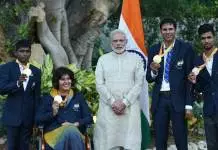Indian Prime Minister Narendra Modi held a high-level cabinet meeting to discuss the strategy that has to be adopted against Pakistan. The Major agenda of the meeting was mainly on the Indus water treaty.
The Meeting was Presided over by the Prime Minister, Minister of External Affairs Mrs. Sushma Swaraj, and Water Resources Ms. Uma Bharathi.PM’s Principal Secretary Nripendra Misra, National Security Advisor Ajit Doval, foreign secretary S Jaishankar, the water resources secretary, and other senior officials were present at the meeting.
During the meeting PM Modi said that “Blood and water can’t flow together” which clearly indicated that no more soft talks with Pakistan.
Terrorists kill 17 soldiers and 30 were injured in Uri Terror Attack
At the meeting, it was decided that India will exploit to the maximum the capacity of three Pak-controlled rivers — Indus, Chenab, Jhelum — as per the Indus Water Treaty.
They also decided that India will also review the construction on Tulbul navigation project, which was ejected in 2007.d India would also use potential of 18,000 megawatt of power from the western rivers under the Treaty.
What is Indus Water Treaty?
This is one of the key pacts for Pakistan as a majority of irrigation, water supply, and hydroelectricity projects depend on this. Any disturbance on Indus water supply might push the country into a severe drought situation.
The treaty got signed between the then prime ministers of both the countries. Jawaharlal Nehru of India and Pakistan’s President General Ayub Khan agreed to share the waters with World Bank’s mediation on September 19th, 1960 in Karachi.
This high-level meeting holds importance given the Uri incident that took place on 18th September 2016 killing 18 Indian army soldiers.
Uri Attacks: Gujarat Businessman to Support Free Education to Martyred Soldiers Children
Pakistan’s renunciation of its involvement in Uri’s attacks has made India take firm and fitting reply this time. As a part of this India has waged strategic tactics to counter the attack. The 56-year old Indus Valley Treaty has survived all the three wars (two full scaled and one major) that took place between India and Pakistan. But now Indian government decided to exploit the rivers as a part of strategic war weapon to make Pakistan realize what India can do.
Indus water treaty assigns Pakistan the right to use six river waters - Beas, Ravi, Sutlej, Indus, Chenab and Jhelum. Though Indus basin lies in India, it originate in China. Another river among these six rivers is Sutlej river which also has its origin in China.
Now, the decision to act against Pakistan by breaching the treaty may attract International intervention. On the other hand, China’s full pledged support for Pakistan is also to be considered. India has some of the water resources dependency on China as river Brahmaputra flows from it. There is no agreement between India and China regarding Brahmaputra river water sharing. All these facts were discussed at today’s meeting.



















